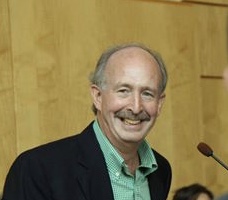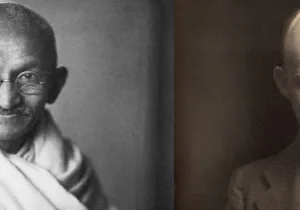Fifty years ago this past October, a remarkable foreign policy convocation took place at the Sheraton Park Hotel in Washington, D.C. The Santa Barbara-based Center for the Study of Democratic Institutions was the sponsor. Founded by well-known education philosopher Robert Hutchins, the Center was an influential 1960s and early 1970s-era think tank that can best be described as mainstream establishment-oriented, but with a left-of-center bent. The Center’s October 1973 convocation was the third in a series taking its title and inspiration from Pope John XXIII’s historic 1963 encyclical, Pacem in Terris (Peace on Earth). The first two Pacem in Terris events explored the moral imperatives identified by Pope John for the last quarter of the twentieth century. Pacem in Terris III focused more narrowly on the United States’ changing role in the world. Reflecting on the convocation, convocation archivist – and participant – Fred Warner Neal noted that the American government “is called upon to forge a new foreign policy in a global setting no longer dominated by the two superpowers . . . . For national interests to have real meaning in an increasingly interdependent world they must be correlated with multinational and transnational interests.”
The purpose of Pacem in Terris III, therefore, was to provide a thorough re-examination of American foreign policy against the backdrop of early 1970s geopolitics, which included U.S.-Soviet détente, normalization of relations with Communist China, the economic rise of Japan, denouement of the Vietnam War, etc. What made this convocation – and re-examination of American foreign policy – so remarkable was its glowing list of participants which included – among other A-listers – Henry Kissinger, Hans Morgenthau, J. William Fulbright, George Will, Edwin Reischauer, Rexford Tugwell, Nelson Rockefeller, Henry Jackson, George McGovern, Stanley Hoffman, David Horowitz, Hubert Humphrey, Theodore Hesburgh, John Kenneth Galbraith, Elizabeth Mann Borgese, Clark Clifford, John Patton Davies, Sam Ervin, Frank Church, Leslie Gelb, David Halberstam, Marshall Shulman, Francis Fritzgerald, Jonas Salk, and Edmund Muskie.
With this line-up, it is not surprising that the four-day convocation attracted a large national attendance of over four thousand persons. As a college undergraduate, I was one of them. Needless to say, it was exciting to encounter in person, and even meet, many iconic scholars, authors, and politicians. A bonus for me was almost bumping into Paul Newman and Joanne Woodward leaving their hotel room. (Newman was a Center for the Study of Democratic Institutions booster.) Looking back at the convocation, it is difficult to believe that an event like this could happen today.
An edited compilation of the convocation proceedings was published a year later in four volumes that have long been out of print. While there is insight of historical interest about 1970s geopolitics to be gleaned from many of the presentations, of special interest and continued relevance today is Henry Kissinger’s opening keynote address, his first major address to an American audience since becoming Secretary of State less than a month earlier. I remember Kissinger’s address well which, not surprisingly, was interrupted several times by protesters.
In his address, Kissinger articulated the foundational assumptions that defined his European-style realism. What is especially striking is Kissinger’s focus on the moral dimensions of foreign policy. But – as Kissinger biographer Niall Ferguson reminds us – Kissinger “thought more about morality and ethics than most self-styled moralists.”
Kissinger began his address by stating that “the need for a national dialogue about national purposes has never been more urgent.” He went to note that “we can no longer overwhelm our problems; we must master them with imagination, understanding, and patience.” Further, the specific questions that demand our attention include: “What do we mean by peace?” “What is the true national interest?” “What is the relationship of peace to justice?”
Throughout his address, Kissinger highlights the moral dilemmas inherent in pursuing foreign policy objectives. “Foreign policy must begin with an understanding that it involves relationships between sovereign countries. . . and that is what gives foreign policy its contingent and ever-incomplete character.”
Kissinger elaborates:
“[D]isagreements among sovereign states can be settled only by negotiation or by power, by compromise or by imposition. Which of these methods prevails depends on the values, the strengths, and the domestic systems of the countries involved. A nation’s values define what is just; its strength determines what is possible; its domestic structure decides what policies can in fact be implemented and sustained.
Thus foreign policy involves two partially conflicting endeavors: defining the interests, purposes, and values of a society and relating them to the interests, purposes, and values of others.
The policymaker therefore must strike a balance between what is desirable and what is possible. Progress will always be measured in partial steps and in the relative satisfaction of alternative goals. Tension is unavoidable between values, which are invariably cast in maximum terms, and efforts to promote them, which of necessity involve compromise. Foreign policy is explained domestically in terms of justice. But what is defined as justice at home becomes the subject of negotiation abroad. It is thus no accident that many nations, including our own, view the international arena as a forum in which virtue is thwarted by the clever practice of foreigners.
In a community of sovereign states, the quest for peace involves a paradox: The attempt to impose absolute justice by one side will be seen as absolute injustice by all others; the quest for total security for some turns into total insecurity for the remainder. Stability depends on the relative satisfaction and therefore also the relative dissatisfaction of the various states. . . .
We must, of course, avoid becoming obsessed with stability. An excessively pragmatic policy will be empty of vision and humanity. . . . By the same token, America cannot be true to itself without moral purpose. This country has always had a sense of mission. Americans have always held the view that America stood for something above and beyond its material achievements. A purely pragmatic policy provides no criteria for other nations to assess our performance and no standards to which the American people can rally.
But when policy becomes excessively moralistic it may turn quixotic or dangerous. A presumed monopoly on truth obstructs negotiation and accommodation. Good results may be given up in the quest for ever-elusive ideal solutions. Policy may fall prey to ineffectual posturing or adventuristic crusades.”
And in a key passage, Kissinger, the realist, observes: “[t]he outsider demonstrates his morality by the perceptions and loftiness of his ideals. The policymaker expresses his morality by implementing a sequence of imperfections and partial solutions in pursuit of his ideals.”
Kissinger’s address also touches upon other overarching themes that define the Kissinger worldview, specifically, the “necessity of shifting from confrontation toward negotiation” and the quest for global stability via “equilibrium.” Kissinger concludes his address by emphasizing the importance of American global leadership. “If this vision is to be realized, America’s active involvement is inescapable. History will judge us by our deeds, not our good intentions.”
There is much to mine in this important address that helps us decipher and learn from Henry Kissinger’s compelling realist worldview. There is also much here that provides helpful guidance for American foreign policy in this new year.







 Sponsor a student for Christianity & National Security 2024
Sponsor a student for Christianity & National Security 2024